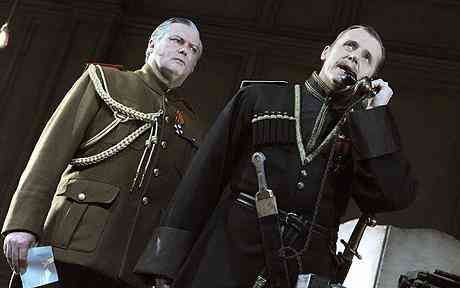By Charles Spencer 1114AM GMT twenty-four March 2010
Previous of Images Next Conleth Hill as Leonid and Anthony Calf as the Hetman Photo ALASTAIR MUIR
Conleth Hill as Leonid and Anthony Calf as the Hetman Photo ALASTAIR MUIR  Anthony Calf in The White Guard Photo ALASTAIR MUIR
Anthony Calf in The White Guard Photo ALASTAIR MUIR With this thrilling, darkly comic and mostly deeply relocating prolongation of Mikhail Bulgakovs The White Guard, executive Howard Davies has delivered the third in an glorious array of productions at the NT set in Russia and the Soviet Union in the 20th century.
He began with Gorkys Philistines (1902) which, between most else, showed the early stirrings of insubordinate fervour. It was followed by Burnt by the Sun, formed on an Oscar-winning French-Russian film, and depicting the apprehension of Stalins purges in the 1930s in a demeanour that miraculously total the universe of Chekhov with a retaining view thriller.
The House of Special Purpose at Chichester, examination Let em Eat Cake at Opera North - examination Oedipus at the National Theatre Review Lucrezia Borgia / Vronique at Buxton Festival - examination The Taming of the Shrew at the Novello Theatre, examinationThe White Guard, initial presented by the Moscow Art Theatre in 1926 and a prime of Stalins even though all Bulgakovs alternative functions were banned, proves as glorious as the predecessors in Andrew Uptons clear new version.
The fool around is set in Kiev in 1918-19, during the polite fight that followed the Russian Revolution. Kiev is in the hands of the Germans, who have allocated a puppet government, but the Ukrainian nationalists are attack the town, and the Bolsheviks arent far behind. Chaos reigns.
Three vital characters, a sister and dual brothers, are formed on members of Bulgakovs own family, here called the Turbins, and are Tsarist supporters against to both the Red Army and the nationalists.
Throughout the length, the fool around fuses the personal and the political, so that scenes of independent family hold up involving most food, splash and love are juxtaposed with aroused scenes of conflict and domestic chicanery.
The play is powered by that admirably Russian brew of wild fun and unfortunate heartache. As the internal personality of the German-controlled puppet supervision creates his shun to Berlin, the play, with the comic Germans and investigate of weakling cowardice, has a ridiculous hold of Allo Allo! about it. But there are deeply slashing moments, too, as the heroine, Elena, practice distressing family waste and brilliantly staged fight scenes that encapsulate the abhorrence of Russias turbulent, blood-drenched history.
Davies directs with virtuosic declaration on perfectly windy and inventive sets by Bunny Christie. Whether entertainment noisy battles or choreographing a waggish inebriated cooking party, Davies never puts a feet wrong, all the time branch the mood on a sixpence with the assistance of a glorious garb in that even the smallest purposes come alive.
Justine Mitchell brings a poetic amiability and humour to Elena, with a sinister weasel of a father (excellent Kevin Doyle), a host of resolute suitors and trenchant suffering to endure. Richard Henders and Daniel Flynn give clever performances as her resisting brothers, whilst Conleth Hill delivers a tasty opening of farcical campery as help to the troops commander in chief presumably using the government.
I additionally desired Pip Carter, irresistibly droll and in contact with as the Turbins cousin, a naive, lovelorn and accident-prone student.
This is entertainment that triumphantly combines the insinuate and the epic, the comic and the profoundly affecting. The NT should right away revitalise the progressing functions in Daviess Russian trilogy and perform all 3 plays in rep. They contain one of the biggest melodramatic achievements of the past decade.
Tickets 020 452 3000
No comments:
Post a Comment